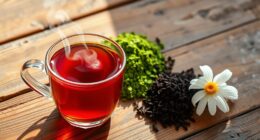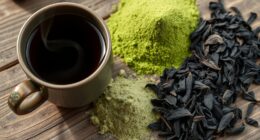I’ve always been a fan of natural remedies, and ginger turmeric tea is one of my favorites. Not only does it taste great, but it has numerous health benefits as well.
But just like with any good thing, moderation is key. So, how much ginger turmeric tea should you drink per day?
Firstly, let’s discuss the health benefits of this powerful duo. Both ginger and turmeric have anti-inflammatory properties that can help reduce pain and inflammation in the body. They also contain antioxidants that protect against cell damage, which may help prevent chronic diseases such as cancer and Alzheimer’s disease.
Additionally, ginger has been shown to aid digestion and relieve nausea while turmeric may improve brain function and lower the risk of heart disease. With all these benefits in mind, it’s no wonder why so many people are turning to ginger turmeric tea for their daily dose of wellness.
Key Takeaways
- Recommended daily intake of ginger turmeric tea is 2-3 cups for most people, but it is important to consult with a healthcare professional before adding it to your daily routine, especially if taking medication or have a medical condition.
- Adults can safely consume up to 4g of ginger per day and turmeric intake should not exceed 1.5g per day, but factors such as age, medications, allergies, and digestive issues should be considered when deciding how much to drink daily.
- Possible side effects of consuming ginger turmeric tea include interference with medications, stomach discomfort, increased risk of bleeding, and irritation of the digestive tract if consumed in large quantities.
- Dosage and brewing guidelines are not well-established, but starting with small amounts and gradually increasing is recommended. Adding honey, lemon juice, cinnamon, or cardamom can enhance flavor and provide additional health benefits, and mixing with other ingredients can create flavorful and healthy tea blends. Supplements can also be a convenient way to ensure consistent doses, but personalized recommendations for appropriate daily intake will depend on individual factors.
Health Benefits of Ginger Turmeric Tea
You’ll be amazed at how much better you feel after drinking just one cup of this delicious ginger turmeric tea, packed with powerful health benefits. Ginger and turmeric are two spices that have been used for centuries in traditional medicine to treat a variety of ailments.
When combined into a tea, they work together to provide numerous health benefits. One of the most notable health benefits of ginger turmeric tea is its ability to reduce inflammation in the body. This can be particularly beneficial for those who suffer from chronic inflammatory conditions such as arthritis or Crohn’s disease.
Additionally, both ginger and turmeric have been shown to have antioxidant properties, which can help protect against cellular damage and promote overall wellness. When it comes to dosage recommendations for ginger turmeric tea, it’s important to note that everyone’s needs may be different.
However, most experts recommend consuming no more than 2-3 cups per day. It’s also important to speak with your healthcare provider before incorporating any new supplements or herbs into your daily routine. As you dive deeper into understanding how much ginger turmeric tea per day is recommended, it’s important to keep these powerful health benefits in mind.
By incorporating this delicious and nutritious beverage into your daily routine in moderation, you can reap the many rewards it has to offer for your overall wellness and vitality.
Recommended Daily Intake
To get the most out of this healthy beverage, it’s important to know the recommended daily intake. Experts recommend consuming no more than 2-3 cups of ginger turmeric tea per day. Drinking this amount can provide various health benefits such as reducing inflammation, improving digestion, and boosting immunity.
It’s worth noting that consuming more than the recommended daily amount may lead to potential risks of overconsumption. Ginger and turmeric are both considered safe when consumed in moderation, but excessive intake may cause stomach upset or interact with certain medications. It’s always best to consult with a healthcare provider before adding any new supplement or herbal remedy into your routine.
Drinking 2-3 cups of ginger turmeric tea per day can offer numerous health effects without posing any significant risks. However, it’s crucial to be mindful of your intake and seek professional advice if you have any concerns about incorporating this beverage into your diet.
Next, let’s dive into some potential risks associated with overconsumption.
Potential Risks of Overconsumption
As I’m researching ginger turmeric tea, it’s important to note the potential risks of overconsumption.
One risk is interference with medications, as both ginger and turmeric can affect blood clotting and interact with certain drugs.
Another possible consequence is stomach discomfort, including nausea and heartburn.
Finally, increased risk of bleeding may occur due to the blood-thinning properties of these herbs.
It’s crucial to be mindful of these risks and consult a healthcare professional before consuming large amounts of ginger turmeric tea regularly.
Interference with medications
Taking ginger turmeric tea with certain medications can interfere with their effectiveness, so it’s important to talk to your healthcare provider before adding this tea to your daily routine.
Some medications that may interact with ginger and turmeric include blood thinners, diabetes medications, and drugs that affect the liver.
It’s also important to note that the dosing guidelines for these herbs have not been well-established, so it’s difficult to know how much is too much.
If you’re taking any medication or have a medical condition, it’s always best to consult with your healthcare provider before starting any new supplement or herb. They can help you determine if ginger turmeric tea is safe for you and offer guidance on appropriate dosing.
In the next section, we will discuss another potential side effect of consuming too much ginger turmeric tea: stomach discomfort.
Stomach discomfort
If you drink ginger turmeric tea like a warm hug on a cold day, be aware that consuming excessive amounts can cause discomfort in the stomach. While ginger and turmeric are known to aid digestion and prevent nausea, overdoing it with these natural remedies can lead to an upset stomach, bloating, or even diarrhea.
This is because both spices contain compounds that stimulate the production of digestive juices and enzymes, which can irritate the lining of your digestive tract if you consume them in large quantities. To avoid stomach discomfort from drinking ginger turmeric tea, it’s best to start with small doses and gradually increase as tolerated.
For most people, one to two cups per day should suffice as a safe and effective dose. However, if you have a sensitive stomach or are prone to gastrointestinal issues such as acid reflux or ulcers, you may want to consult your doctor before adding this beverage to your daily routine. Additionally, if you experience any adverse symptoms after drinking ginger turmeric tea, such as abdominal pain or cramping, stop consuming it immediately and seek medical attention.
As we move onto the next section about ‘increased risk of bleeding’, it’s important to note that while ginger and turmeric have many health benefits when consumed in moderation, they also have blood-thinning properties that may interfere with certain medications or medical conditions. Therefore, it’s crucial to speak with your healthcare provider before using these natural remedies alongside any prescription drugs or undergoing surgery.
Increased risk of bleeding
Consuming large amounts of ginger and turmeric may lead to an increased risk of bleeding, making it important for individuals on certain medications or with medical conditions to consult their healthcare provider before using these natural remedies. Both ginger and turmeric have anti-inflammatory properties that can help reduce pain and inflammation in the body. However, when consumed in excess, they can interfere with blood clotting and increase the risk of bleeding.
To minimize bleeding risks, it’s important to adhere to recommended dosage limits for ginger and turmeric. According to the National Center for Complementary and Integrative Health (NCCIH), adults can safely consume up to 4 grams of ginger per day, while turmeric intake should not exceed 1.5 grams per day. It’s also crucial to avoid taking high doses of these herbal remedies if you’re taking blood-thinning medications such as warfarin or aspirin without consulting your doctor first. By being mindful of dosage limits and potential interactions with other medications, you can safely incorporate ginger and turmeric into your daily routine for their many health benefits.
As we consider incorporating ginger and turmeric into our daily routine, there are several factors we need to keep in mind beyond just bleeding risks.
Factors to Consider
When deciding how much ginger turmeric tea to drink daily, it’s important to consider factors like your overall health, caffeine sensitivity, and personal taste preferences. Here are some other factors that can help you determine the right amount for you:
-
Age: As we age, our bodies tend to absorb nutrients less efficiently. If you’re over 50 years old, you may need to drink more ginger turmeric tea to get the same benefits as someone younger.
-
Medications: Some medications can interact with ginger and turmeric and increase the risk of bleeding or other side effects. If you’re taking any prescription drugs, talk to your doctor before consuming large amounts of these herbs.
-
Allergies: If you have a known allergy to ginger or turmeric, obviously steer clear of this beverage altogether.
-
Digestive issues: Ginger is often used as a natural remedy for nausea and digestive problems. However, if you already suffer from acid reflux or stomach ulcers, drinking too much could make your symptoms worse.
-
Best time to consume: Many people find that drinking ginger turmeric tea first thing in the morning helps them feel energized for the day ahead. Others prefer sipping on it before bed as a way to wind down.
So there’s no one-size-fits-all answer when it comes to how much ginger turmeric tea is right for you. It’s best to start with small amounts (say, half a cup) and gradually increase as needed based on your body’s response.
Next up, let me share some tips on brewing this delicious elixir at home!
Brewing Tips
Now that we’ve discussed the factors to consider when consuming ginger turmeric tea, let’s move on to brewing techniques. The amount of ginger and turmeric used in brewing can significantly affect the flavor and potency of the tea.
Generally, it’s recommended to use about 1-2 teaspoons of grated or chopped ginger root and 1-2 teaspoons of grated or powdered turmeric per cup of water.
To make the tea, simply add your desired amount of ginger and turmeric to a pot or teapot with boiling water. Allow it to steep for 10-15 minutes before straining out the solids and enjoying. However, you may adjust these measurements based on your personal preference or tolerance levels.
Furthermore, different brewing techniques can also result in varying flavor variations of the tea. For example, adding honey or lemon juice can help balance out any bitterness from the spices while providing additional health benefits. Experimenting with different ingredients such as cinnamon or cardamom can also provide unique flavor profiles that complement the ginger and turmeric.
As an alternative way to consume ginger and turmeric, you could try incorporating these spices into your meals by adding them to smoothies, soups, curries, or stir-fry dishes. This will not only provide a flavorful kick but also add numerous health benefits associated with these spices.
Alternative Ways to Consume Ginger and Turmeric
As for alternative ways to consume ginger and turmeric, I personally take supplements that contain these two powerful ingredients. There are many options available in the market, ranging from capsules to powders.
I also try to incorporate more food sources of ginger and turmeric into my diet, such as adding fresh or ground ginger and turmeric to my meals or drinking golden milk made with turmeric. These methods can help provide additional health benefits beyond just drinking ginger turmeric tea.
Supplements
You should consider taking supplements to boost the health benefits of ginger turmeric tea, such as capsules or powder mixed into your smoothies. However, it’s important to consult with a healthcare professional before starting any supplement regimen as they may interact with certain medications or have potential side effects. It’s also important to note that supplement dosages may vary depending on the brand and concentration.
To help you get started, here is a table outlining recommended dosage ranges for common ginger and turmeric supplements:
| Supplement | Dosage range |
|---|---|
| Ginger capsules | 75-2000mg/day |
| Turmeric capsules/powder | 500-2000mg/day |
| Curcumin capsules | 400-600mg/day |
It’s worth noting that these dosages are generally considered safe for most people, but it’s always best to start with a lower dose and gradually increase if needed. Additionally, be sure to read labels carefully and follow manufacturer recommendations.
When considering how much ginger turmeric tea per day, supplements can be a convenient way to ensure you’re getting consistent doses of these powerful herbs. However, don’t forget about incorporating food sources into your diet as well!
Food sources
Looking for delicious ways to incorporate the health benefits of ginger and turmeric into your diet? Check out these food sources that are packed with flavor and nutrition!
-
Curry dishes: These flavorful dishes often contain both ginger and turmeric, along with other healthy spices like cumin and coriander. Try making a vegetable or chicken curry at home for a satisfying meal that’s also good for you.
-
Smoothies: Adding fresh ginger and turmeric to your smoothie can provide a healthy kick to start your day. Blend them with fruits like pineapple or mango for a tropical twist.
-
Roasted vegetables: Tossing chopped root vegetables like sweet potatoes, carrots, and parsnips with olive oil, fresh grated ginger, and ground turmeric before roasting in the oven can create a delicious side dish packed with nutrients.
Ginger and turmeric have been used in culinary traditions around the world for centuries due to their unique flavors and numerous health benefits. In addition to tea, incorporating these ingredients into meals is an easy way to boost their nutritional value. For those interested in exploring more culinary uses of ginger and turmeric, there are plenty of recipes available online that showcase these versatile ingredients. How to Make Ginger Turmeric Tea at Home will be discussed further in the next section about combining ginger and turmeric with other ingredients.
Combining Ginger and Turmeric with Other Ingredients
Mixing ginger and turmeric with other ingredients can create flavorful and healthy tea blends that can be enjoyed throughout the day. Ginger turmeric tea recipes are popular for their immune-boosting properties, anti-inflammatory effects, and digestive benefits.
Combining these two powerful ingredients with other herbs or spices such as cinnamon, cardamom, or black pepper can enhance the flavor profile while also providing additional health benefits. Both ginger and turmeric have been used for centuries in cooking to add flavor and medicinal value to dishes.
Health benefits of ginger and turmeric in cooking include improved digestion, reduced inflammation, and increased antioxidant activity. Adding them to teas not only enhances the taste but also provides a convenient way to incorporate them into your daily routine. For example, adding a pinch of black pepper to a ginger-turmeric tea blend can help increase the absorption of curcumin, the active compound in turmeric responsible for its anti-inflammatory effects.
Similarly, adding honey or lemon juice can provide additional antioxidant activity while also improving overall taste. With so many options available, it’s easy to personalize your own perfect cup of ginger-turmeric tea based on your preferences and specific health needs.
Moving forward, personalized recommendations for how much ginger turmeric tea per day is appropriate will depend on individual factors such as age, weight, current health status, and medication use.
Personalized Recommendations
For an individualized approach, it’s crucial to consider factors like age, weight, health status, and medication use when determining the optimal amount of GTT for daily consumption. A general guideline is to consume no more than 3-4 cups of ginger turmeric tea per day. However, this may vary based on personal factors and goals.
Dosage variations can be made based on your specific needs and health concerns. For example, if you’re experiencing inflammation or pain, you may want to increase your intake of ginger and turmeric. On the other hand, if you have a medical condition or are taking medication that interacts with these ingredients, it may be necessary to limit your consumption or consult with a healthcare provider before adding GTT into your routine.
It’s important to note that while GTT can have many potential health benefits, too much of a good thing can also have negative effects. As with any new supplement or addition to your diet, start by consuming small amounts and gradually increasing as tolerated. Always listen to your body and adjust accordingly.
When considering personalized recommendations for consuming ginger turmeric tea daily, it’s crucial to take into account individual factors like age and weight as well as health status and medications used regularly. Dosage variations can help tailor GTT intake based on specific needs such as reducing inflammation or working alongside certain medications without causing adverse reactions. It’s important not to overdo it with GTT despite its many benefits; starting small and gradually increasing intake is the best approach for optimal results in the long run.
Moving forward from personalized recommendations for optimal GTT consumption per day leads us towards additional resources and recipes that can provide inspiration in incorporating this healthy beverage into our everyday lives without getting bored by repetition!
Additional Resources and Recipes
Now that we’ve discussed personalized recommendations for ginger turmeric tea consumption, let’s take a look at some additional resources and recipes. There are many variations of ginger turmeric tea that can be made at home using simple ingredients. These recipes not only offer a delicious way to consume these herbs but also provide various health benefits.
One popular recipe for ginger turmeric tea involves simmering fresh ginger and turmeric in water for about 10 minutes. Honey, lemon, and black pepper can then be added to taste. This variation is known for its anti-inflammatory properties and may help reduce pain and swelling.
Another recipe includes adding cinnamon, cardamom, and cloves to the mix for added flavor and potential digestive benefits. A touch of coconut milk can also make this drink creamier while providing healthy fats.
With so many variations available online, it’s easy to find a recipe that suits your taste buds while still reaping the numerous health benefits of ginger turmeric tea.
Overall, incorporating ginger turmeric tea into your daily routine can provide numerous health benefits. Whether you prefer it hot or cold or with added spices or natural sweeteners, there are plenty of ways to enjoy this herbal beverage. By experimenting with different recipes and finding what works best for you personally, you can reap the full range of potential benefits from these powerful herbs in every sip.
Frequently Asked Questions
Can ginger turmeric tea be consumed during pregnancy?
As someone who’s researched the topic, I can share some information on the benefits and risks of consuming ginger turmeric tea during pregnancy.
Ginger and turmeric have both been used for medicinal purposes for centuries, and studies suggest that they may have anti-inflammatory and antioxidant properties. However, there isn’t enough research to determine if these herbs are safe during pregnancy.
Some experts recommend avoiding them altogether, while others suggest limiting intake to a small amount per day. It’s important to talk with your healthcare provider before consuming any herbal teas or supplements during pregnancy.
There are alternative options available, such as peppermint or chamomile tea, which have been deemed safe for pregnant women by many healthcare professionals.
How does ginger turmeric tea affect blood pressure?
Ginger turmeric tea has potential benefits for blood pressure. The active compounds in ginger and turmeric, such as curcumin and gingerols, have anti-inflammatory properties that can reduce inflammation in the body, including in the blood vessels. This reduction may lead to lower blood pressure levels over time. However, it’s important to note that consuming large amounts of ginger and turmeric may have potential risks. It’s recommended to consult with a healthcare provider before adding ginger turmeric tea to your daily routine, especially if you have any preexisting medical conditions or are taking medications. The optimal dosage and timing of consumption for blood pressure benefits are still unclear and may vary depending on an individual’s health status and other factors.
Is it safe to consume ginger turmeric tea with certain medications?
When it comes to consuming ginger turmeric tea, it’s important to be aware of potential drug interactions. Some medications, such as blood thinners and diabetes medication, may be affected by the ingredients in the tea.
Additionally, excessive consumption of ginger turmeric tea may have negative effects on liver health. It’s always best to consult with a healthcare provider before adding any new supplement or food item to your daily routine, especially if you’re taking medications or have pre-existing health conditions.
By being cautious and informed, you can enjoy the benefits of ginger turmeric tea without compromising your overall well-being.
What are the differences between fresh and ground ginger and turmeric when making tea?
When it comes to making ginger turmeric tea, the choice between using fresh or ground spices will affect the flavor and benefits of your brew.
Fresh ginger and turmeric have a stronger aroma and taste compared to their powdered counterparts, but the latter is more convenient and easier to store.
In terms of health benefits, both forms contain similar compounds that have anti-inflammatory and antioxidant properties.
However, some studies suggest that fresh turmeric may be more effective in reducing inflammation than its ground form.
As for preparation techniques, slicing or grating fresh ginger and turmeric can release more oils and enhance their flavors when steeped in hot water.
Ground spices can be mixed directly into the tea without any prepping necessary.
The best recipes for ginger turmeric tea blends vary depending on personal preference but commonly include ingredients like lemon, honey, cinnamon or black pepper for added flavor and health benefits such as boosting immunity or aiding digestion.
How long can ginger turmeric tea be stored in the refrigerator?
When it comes to storing ginger turmeric tea, the shelf life can vary depending on how it’s been prepared. Typically, homemade tea stored in the refrigerator can last anywhere from 3-5 days. It’s important to keep the tea in an airtight container to prevent any contamination or spoilage.
However, if you’ve purchased pre-made ginger turmeric tea from a store, be sure to check the expiration date on the packaging as this will give you an idea of its shelf life.
Overall, it’s best to consume your tea as soon as possible for optimal taste and health benefits.
Conclusion
Well, after all the research and brewing experiments, I’ve come to a conclusion about how much ginger turmeric tea one should consume in a day. And that conclusion is…drumroll please…it depends.
Yes, folks, there’s no one-size-fits-all answer when it comes to the recommended daily intake of this delightful beverage. It all boils down to factors such as your health goals, medical conditions, and personal preferences.
So, if you want to experience the many health benefits of ginger turmeric tea without any potential risks of overconsumption, consult with your healthcare provider and experiment with different brewing methods until you find what works best for you.
Happy sipping!










